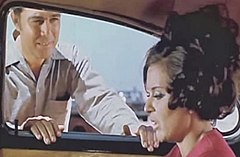Youssef Chahine
Youssef Chahine (Arabic: يوسف شاهين, romanized: Yūsuf Shāhīn [ˈjuːsɪf ʃæˈhiːn]; 25 January 1926 – 27 July 2008) was an Egyptian[1] film director.
[3] A winner of the Cannes 50th Anniversary Award (for lifetime achievement), Chahine was credited with launching the career of actor Omar Sharif.
Chahine would stay under his bed and in his room for hours, picturing himself in the industry- whether in a projection theater, a cinema hall or a production company.
When asked about his childhood and early interest in cinema, Chahine said:"At the age of Eight, I discovered that 9.5mm films and projectors were being sold in stores.
[11] Another memory Chahine was fond of, was how his father took him to the desert, and taught him how to look for landmarks and find his way back home.
[14] Fascinated by the performing arts from an early age, young Chahine began to create shows at home for his family.
[15][failed verification] After returning from Pasadena, Chahine didn't work in Egyptian theater or film.
[17] He won the Silver Bear – Special Jury Priz at the 29th Berlin International Film Festival for Alexandria... Why?
The producer Humbert Balsan went to Cannes in 2004 with Alexandria... New York, his ninth film with the Egyptian director since 1985's Adieu, Bonaparte.
His early films in Egypt[20] included The Blazing Sun (1954), which begun while Farouk was still King and dealing with a peasant farmer's challenge to a feudal landlord.
The same year he started writing The Emigrant (1994), a story inspired by the Biblical character of Joseph, son of Jacob.
Chahine is credited for directing five films starring Salah Zulfikar including significant productions such as Saladin the Victorious (1963), The Nile and the Life (1968) and Those People of the Nile (1972) and also credited for discovering Omar Sharif, whose first starring role was in The Blazing Sun (1954).
The film draws a parallel between Chahine's life and the narrative he tells: it explores the relationship between the United States and Egypt.
Kinawi cuts pictures of women from magazines for the little cabin that he lives in, and has a psychosexual obsession with Hanouma (played by the acknowledged actress Hind Rostom), who is engaged to Abou Seri' (Farid Shawki), porter and trade union organiser.
According to Magda, the lead actress and producer of the film, Egypt had banned the screening in order to not harm political relations with France.
It was scripted by Ezz El-Dine Zulficar, Naguib Mahfouz and the poet and progressive writer, Abderrahman Cherkaoui.
Saladin is portrayed as an educated and peaceful man—at one point he is asked to give clandestine medical help to Richard the Lion Heart, who was shot by an arrow.
Chahine was well aware of the propaganda dimension that implicitly painted President Nasser as a modern-era Saladin, stating "My own sympathies were with pan-Arabism, which I still believe in."
As a result of a heart operation, he reviews his life: moments of Chahine's own films are replayed against their autobiographical and social historical context.
Memory is very important to Chahine's most recent work —whether of the "city of my childhood, Alexandria, between the two world wars tolerant, secular, open to Muslims, Christians and Jews" or of a more distant past: such as evoked in Adieu Bonaparte (1985), based on the cultural aspect of Bonaparte's expedition into Egypt (1798).
The film portrays his friendship with a group of intellectuals and artists, including a singer played by Mohamed Mounir, who come under attack from a rising movement of militant fundamentalists backed by the region's ruler, Caliph al-Mansour.
The film incorporates political themes and songs that can be seen as allegorical, since it was produced and released during a period when Egypt was experiencing a series of Islamist terrorist attacks.
[26] Despite being internationally renowned, and successful in Egypt, Chahine has often been the center of controversies due to his liberal views, portrayal of sexuality and political critique.
Cairo Station, albeit a classic of Egyptian cinema, shocked viewers both by the sympathy with which a "fallen woman" is depicted and by the violence with which another is killed.
[27] The Sparrow attacked Egyptian corruption and blamed it for the defeat in the Six Day War, which gained backlash from government supporters.
During the several following years, Chahine found himself increasingly in conflict with the government-backed film industry of Egypt and its heavy political restrictions in filmmaking.
In 1964, after filming (1965, Dawn of a New Day), he traveled to Lebanon, where he shot two musicals: Bayya al-Khawatim (1965, Ring Seller) and Rimal al-Dhahab (1967, Sands of Gold).
Ring Seller became one of the best musicals of Arab cinema, bringing success to Youssef Chahine, whereas Sands of Gold, due to delays in shooting and its box-office failure, forced him to quit his work in Lebanon and return to Egypt.
The film features a mother who exposes a woman's scam after she and her son had fallen in love and planned to marry.
[33] Chahine was hospitalised at El Shorouq hospital in Cairo, having fallen into a coma following an apparent cerebral haemorrhage, on Sunday, 15 June 2008.

